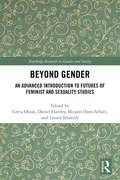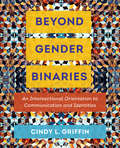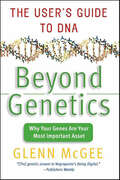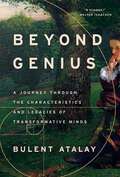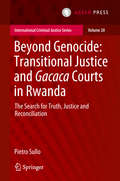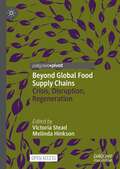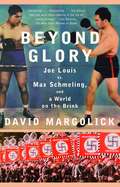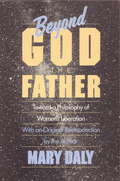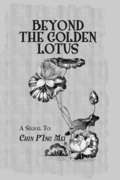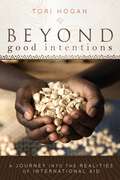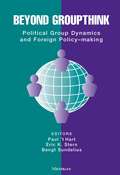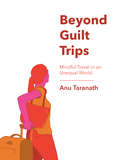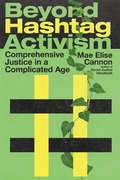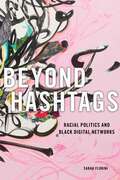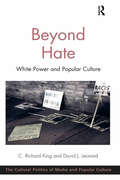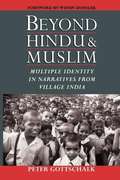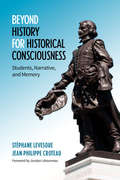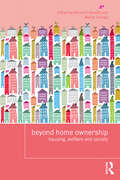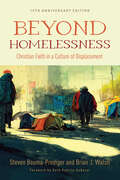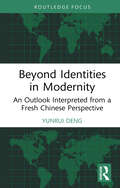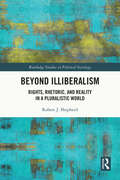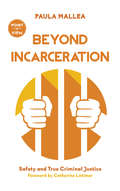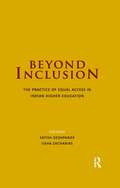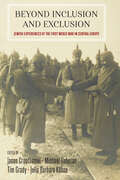- Table View
- List View
Beyond Gender: An Advanced Introduction to Futures of Feminist and Sexuality Studies (Routledge Research in Gender and Society)
by Greta Olson Mirjam Horn-Schott Daniel Hartley Regina Leonie SchmidtScholars and activists often narrate the history of gender and feminism as a progression of "waves," said to mark high points of innovation in theory and moments of political breakthrough. Arguing for the notion of multiple futurities over that of progressive waves, Beyond Gender combines theoretical work with practical applications to provide an advanced introduction to contemporary feminist and sexuality research and advocacy. This comprehensive monograph documents the diversification of gender-related disciplines and struggles, arguing for a multidisciplinary approach to issues formerly subsumed under the unified field of gender studies. Split into two parts, the volume demonstrates how the notion of gender has been criticized by various theories pertaining to masculinity, feminism, and sexuality, and also illustrates how the binary and hierarchical ordering system of gender has been troubled or overcome in practice: in queer performance, legal critique, the classroom, and textual analysis. Taking a fresh approach to contemporary debates in feminist and sexuality studies, Beyond Gender will appeal to undergraduate students interested in fields such as Feminism and Sexuality Studies, Gender Studies, Feminist Theory, and Masculinity Studies.
Beyond Gender Binaries: An Intersectional Orientation to Communication and Identities
by Cindy L. GriffinBeyond Gender Binaries uses a feminist, intersectional, and invitational approach to understanding identities and how they relate to communication. Taking readers outside the familiar binary constructions of gender and identity, Cindy L. Griffin addresses—through a feminist intersectional lens—communication, identity, power and privilege, personhood and citizenship, safety in public and private spaces, and hegemony and colonialism. Twelve chapters focus on critical learning through careful exploration of key terms and concepts. Griffin illustrates these with historical and contemporary examples and provides concrete guides to intersectional approaches to communication. This textbook highlights not just the ways individuals, systems, structures, and institutions use communication to privilege particular identities discursively and materially, but also the myriad ways that communication can be used to disrupt privilege and respectfully acknowledge the nonbinary and intersectional nature of every person’s identity. Key features include: Intersectional approaches to explaining and understanding identities and communication are the foundation of each chapter and inform the presentation of information throughout the book.Contemporary and historical examples are included in every chapter, highlighting the intersectional nature of identity and the role of communication in our interactions with other people.Complex and challenging ideas are presented in clear, respectful, and accessible ways throughout the book.
Beyond Genetics: The User's Guide to DNA
by Glenn McGeeGenetic science is about to radically alter our lives. Sooner than you can imagine, human beings will be capable of diagnosing their own illnesses, designating the sex of their children, even designing the food they eat -- all as easily as using a cell phone. Now is the time for every one of us to take control of our DNA, and one man is uniquely qualified to show us how: Glenn McGee, bioethicist at the University of Pennsylvania, pioneer in the study of "home genetics," and the acknowledged wunderkind of the exciting world found at the nexus of life science and computer technology.One of the most respected authorities in the field of genomics -- the study of the genetic "software" inside plants, animals, and us -- McGee takes us on an eye-opening journey behind the headlines and into the heart of this formidable cutting-edge science. Probing the far-ranging ethical and legal implications of genomic research, McGee tackles its most controversial and hotly debated aspects -- from patenting your DNA to genetic engineering at the supermarket -- and explodes unnecessary fears about this wondrous new knowledge.We live in a brave new world. Beyond Genetics provides us with the knowledge we need to take the right steps forward into tomorrow ... and beyond.
Beyond Genius: A Journey Through the Characteristics and Legacies of Transformative Minds
by Bulent AtalayAn in-depth and unified exploration of genius in the arts and sciences through the life and works of five seminal intellectual and cultural figures: Leonardo da Vinci, William Shakespeare, Isaac Newton, Ludwig von Beethoven, and Albert Einstein.Who among us hasn't read Hamlet, listened to the Fifth Symphony, gazed at the Mona Lisa, or marveled at the three laws of physics and the Theory of Relativity and been struck with the same simple question: how on Earth did they do it? Where did these masters draw inspiration to produce some of the most stunning achievements in human history? Were their brains wired differently than ours? Did they have special traits or unique experiences that set them on the path to greatness? Genius is a broad and elusive concept, one that is divisive and hard to define—and gravely misunderstood. There are &“ordinary&” geniuses who achieve remarkable feats of brilliance, as well as &“magicians&” (a term James Gleick invoked to describe Richard Feynman) who make an outsize impact on their given field. But highest among them are transformative geniuses, those rare individuals who redefine their fields or open up new universes of thought altogether. These are the masters whose genius Bulent Atalay decodes in his engrossing, enlightening, and revelatory book. No, Atalay doesn&’t have a road map for how we might become the next Einstein or Leonardo, but his revolutionary study of genius gives us a stunning new lens through which to view humanity&’s most prolific thinkers and creators and perhaps pick up some inspiration along the way. At first, it seems that transformative geniuses don&’t follow any sort of topography. Their prodigious output looks effortless, they leap from summit to summit, and they probably couldn&’t explain exactly how they went about solving their problems. They might not even recognize themselves in the ways we talk about them today. Atalay argues that these heroes fit more of a mold than we might think. As evidence, he rigorously dissects the lives, traits, habits, and thought patterns of five exemplars—Leonardo, Shakespeare, Newton, Beethoven, and Einstein— to map the path of the transformative genius. How did Beethoven, who could not perform basic multiplication, innately encode the Fibonacci Sequence in his symphonies? Is it possible that we understate Shakespeare&’s poetic influence? How did Leonardo become equally prolific in both the arts and the sciences? How did Newton formulate the universal laws of physics, the basis of so many other sciences? And what prompted TIME Magazine to declare Einstein, a man whose very name is synonymous with genius, the &“Individual of the 20th Century&”? With great clarity and attention to detail, Atalay expertly traces how these five exemplars ascended to immortality and what their lives and legacies reveal about how transformative geniuses are made
Beyond Genocide: The Search for Truth, Justice and Reconciliation (International Criminal Justice Series #20)
by Pietro SulloCombining both legal and empirical research, this book explores the statutory aspects andpractice of gacaca courts (inkiko gacaca), the centrepiece of Rwanda’s post-genocide transitionaljustice system, assessing their contribution to truth, justice and reconciliation. Thevolume expands the knowledge regarding these courts, assessing not only their performancein terms of formal justice and compliance with human rights standards, but also their actualmodus operandi.Scholars and practitioners have progressively challenged the idea that genocide should beaddressed exclusively through ‘westernised’ criminal law, arguing that the uniqueness ofeach genocidal setting requires specific context-sensitive solutions. Rwanda’s experience withgacaca courts has emerged as a valuable opportunity for testing this approach, offering newhome-grown solutions for dealing with the violence experienced in 1994 and beyond that werenever previously tried. Due to their unique features, gacaca courts have attracted the attentionof researchers from different disciplines and triggered dichotomous reactions and appraisals.Anchoring the assessment of gacaca courts in a comprehensive legal analysis in conjunctionwith field research, this book addresses the tensions existing within the literature. Throughthe direct observation of gacaca trials, interviews and informal talks with genocide survivors,defendants, ordinary Rwandans, academics and practitioners, a purely legalistic perspectiveis overcome, offering instead an innovative bottom-up approach to meta-legal concepts suchas justice, fairness, truth and reconciliation. Outlining their strengths and shortcomings, thisbook highlights what aspects of gacaca courts can be useful in other post-genocide contexts,and provides crucial lessons learned in the realm of transitional justice.The book is primarily aimed at researchers working in, among others, the areas of internationalcriminal law, genocide and transitional justice, while practitioners, students and others with aprofessional interest in the topics addressed may also find the issues raised relevant.Pietro Sullo teaches public international law and international diplomatic law at the BrusselsSchool of International Studies of the University of Kent in Brussels. He is particularlyinterested in international law, human rights, transitional justice, international criminal lawand refugee law.
Beyond Global Food Supply Chains: Crisis, Disruption, Regeneration
by Victoria Stead Melinda HinksonThis open access book takes the upheaval of the global COVID-19 pandemic as a springboard from which to interrogate a larger set of structural, environmental and political fault lines running through the global food system. In a context in which disruptions to the production, distribution, and consumption of food are figured as exceptions to the smooth, just-in-time efficiencies of global supply chains, these essays reveal the global food system as one that is inherently disruptive of human lives and flourishing, and of relationships between people, places, and environments. The pandemic thus represents a particular, acute moment of disruption, offering a lens on a deeper, longer set of systemic processes, and shining new light on transformational possibilities.
Beyond Glory: Joe Louis vs. Max Schmeling, and a World on the Brink
by David MargolickNothing in the annals of sports has aroused more passion than the heavyweight fights in New York in 1936 and 1938 between Joe Louis and Max Schmeling--bouts that symbolized and galvanized the hopes, hatreds, and fears of a world moving toward total war. David Margolick takes us into the careers of both men. We see Louis in his boyhood and amateur days in Detroit and Chicago, and the blossoming of his boxing genius. e see him, already a near-mythical figure, taking New York by storm in the 1930s, fighting before record crowds, the savior of a sport that had fallen into decline and a long sought after symbol of redemption for black America after the scandalous reign of Jack Johnson two decades earlier. And we witness how with talent, a gentle personality, and shrewd management, Louis managed to trump the brutal racism directed at him and came to dominate what had been primarily a white man's sport, becoming a hero of unprecedented power and influence in black America. Schmeling, we learn, was a kind of chameleon, a cultural icon in Weimar Germany who seamlessly, disconcertingly, maintained his privileged status after the Nazi takeover. He pulled off a remarkable feat, relying on a Jewish manager and a Jewish promoter in New York while being extolled at home as a model of "racial superiority." Margolick meticulously examines all the complex ties that developed between Schmeling and the Nazis, shattering the myth that they frowned upon him before he upset Louis in 1936--he was a ten-to-one underdog--and ostracized him after losing to Louis two years later. We see the extraordinary buildup to the 1938 rematch--the worsening international tensions seemingly raising the stakes--in which Louis would need only 124 seconds to defeat Schmeling, while radio allowed the whole world to listen. Margolick vividly captures the outpouring of emotion that the two fighters aroused in the white South, in the black and Jewish communities in the United States, in Germany, everywhere, and he makes clear the cultural and social divisions the two men came to represent as the threat posed by the Nazis became increasingly clear, and as America began to feel the effects of a nascent civil rights movement. Schmeling's postwar success in business and Louis's sad decline add a poignant coda. A book at once about sports and about a pivotal moment in twentieth-century history, Beyond Glory pulses with energy from first to last.
Beyond God the Father
by Mary DalyIn this text, Mary Daly examines religion as a major cause of women's repression over the last 3,000 years. From Genesis to the writings of contemporary theologians, she exposes the misogyny which still continues to flourish in Christianity.
Beyond The Golden Lotus
by VladimirFirst published in 2005. Routledge is an imprint of Taylor & Francis, an informa company.
Beyond Good Intentions: A Journey into the Realities of International Aid
by Tori HoganYoung and idealistic, Tori Hogan travels to Kenya as an intern for Save the Children, intent upon doing her part to improve the lives of refugees. But the cynicism of a young African boy changes Tori's life and sets her on a course to reconsider everything she thought she knew about helping those in need. Years later, Tori returns to Africa and embarks on a journey through Kenya, Uganda, and Rwanda, searching for the truth about what does and does not work in international aid. While there are glimmers of hope along the way, she discovers an aid industry mired in waste, ineffective solutions imposed by well-intentioned outsiders, and humanitarian efforts that do more harm than good. Beyond Good Intentionsis both a moving story of one woman's personal journey and an urgent call to arms to change the way we offer aid overseas. Tori's candid reflections on international aid shine a light on our ability to improve the lives of others, often in ways we would never expect.
Beyond Groupthink
by Paul 'T Hart Eric K. Stern Bengt SundeliusStrategic issues and crises in foreign policy are usually managed by relatively small groups of elite policymakers and their closest advisors. Since the pioneering work of Irving Janis in the early 1970s, we have known that the interplay between the members of these groups can have a profound and, indeed, at times a pernicious influence on the content and quality of foreign policy decisions. Janis argued that "groupthink," a term he used to describe a tendency for extreme concurrence-seeking in decision-making groups, was a major cause of a number of U.S. foreign policy fiascoes. And yet not all small groups suffer from groupthink; in fact many high-level bodies are handicapped by an inability to achieve consensus at all. Beyond Groupthink builds upon and extends Janis's legacy. The contributors develop a richer understanding of group dynamics by drawing on alternate views of small-group dynamics. The relevant literature is reviewed and the different perspectives are explored in detailed case studies. The contributors link the group process to the broader organizational and political context of the policy process and stress the need to develop a multi-level understanding of the collegial policy-making process, combining the insights drawn from micro-level theories with those derived from study of broader political phenomena. The contributors include Alexander George, Sally Riggs Fuller, Paul D. Hoyt, Ramon J. Aldag, Max V. Metselaar, Bertjan Verbeek, J. Thomas Preston, Jean A. Garrison, and Yaacov Y. I. Vertzberger. This book should appeal to political scienctists and international relations specialists, as well as researchers in social psychology, public administration, and management interested in group decision-making processes.
Beyond Guilt Trips: Mindful Travel in an Unequal World
by Anu TaranathEvery year, hundreds of thousands of young people pack their bags to study or volunteer abroad. Well-intentioned and curious Westerners—brought up to believe that international travel broadens our horizons—travel to low-income countries to learn about people and cultures different from their own. But while travel abroad can provide much-needed perspective, it can also be deeply unsettling, confusing, and discomforting. Travelers can find themselves unsure about how to think or speak about the differences in race or culture they find, even though these differences might have fueled their desire to travel in the first place. Beyond Guilt Trips helps us to unpack our Western baggage, so that we are better able to understand our uncomfortable feelings about who we are, where we come from, and how much we have. Through engaging personal travel stories and thought-provoking questions about the ethics and politics of our travel, Beyond Guilt Trips shows readers ways to grapple with their discomfort and navigate differences through accountability and connection.
Beyond Hashtag Activism: Comprehensive Justice in a Complicated Age
by Mae Elise CannonThe world is not as God intends it to be.
Beyond Hashtags: Racial Politics and Black Digital Networks (Critical Cultural Communication #19)
by Sarah FloriniHow black Americans use digital networks to organize and cultivate solidarityUnrest gripped Ferguson, Missouri, after Mike Brown, an unarmed black teenager, was shot and killed by Officer Darren Wilson in August 2014. Many black Americans turned to their digital and social media networks to circulate information, cultivate solidarity, and organize during that tumultuous moment. While Ferguson and the subsequent protests made black digital networks visible to mainstream media, these networks did not coalesce overnight. They were built and maintained over years through common, everyday use.Beyond Hashtags explores these everyday practices and their relationship to larger social issues through an in-depth analysis of a trans-platform network of black American digital and social media users and content creators. In the crucial years leading up to the emergence of the Movement for Black Lives, black Americans used digital networks not only to cope with day-to-day experiences of racism, but also as an incubator for the debates that have since exploded onto the national stage. Beyond Hashtags tells the story of an influential subsection of these networks, an assemblage of podcasting, independent media, Instagram, Vine, Facebook, and the network of Twitter users that has come to be known as “Black Twitter.” Florini looks at how black Americans use these technologies often simultaneously to create a space to reassert their racial identities, forge community, organize politically, and create alternative media representations and news sources. Beyond Hashtags demonstrates how much insight marginalized users have into technology.
Beyond Hate: White Power and Popular Culture (The Cultural Politics of Media and Popular Culture)
by C. Richard King David J. LeonardBeyond Hate offers a critical ethnography of the virtual communities established and discursive networks activated through the online engagements of white separatists, white nationalists, and white supremacists with various popular cultural texts, including movies, music, television, sport, video games, and kitsch. Outlining the ways in which advocates of white power interpret popular cultural forms, and probing the emergent spaces of white power popular culture, it examines the paradoxical relationship that advocates of white supremacy have with popular culture, as they finding it to be an irresistible and repugnant reflection of social decay rooted in multiculturalism. Drawing on a range of new media sources, including websites, chat rooms, blogs and forums, this book explores the concerns expressed by advocates of white power, with regard to racial hierarchy and social order, the crisis of traditional American values, the perpetuation of liberal, feminist, elitist ideas, the degradation of the family and the fetishization of black men. What emerges is an understanding of the instruments of power in white supremacist discourses, in which a series of connections are drawn between popular culture, multiculturalism, sexual politics and state functions, all of which are seen to be working against white men. A richly illustrated study of the intersections of white power and popular culture in the contemporary U.S., and the use of use cyberspace by white supremacists as an imagined site of resistance, Beyond Hate will appeal to scholars of sociology and cultural studies with interests in race and ethnicity, popular culture and the discourses of the extreme right.
Beyond Hindu and Muslim: Multiple Identity In Narratives From Village India
by Peter Gottschalk Wendy Doniger"The book offers a deep and meticulous ethnography of persons talking about who they are--in relation to a particular place or set of places, situated both in time and space. This book achieves a rare balance between accessibility and richness." --Journal of the American Oriental Society "In South Asia's current climate, in which forces of religious revivalism have taken violent turns, it is more than ever necessary to understand how Indians' multiple identities actually work. Gottschalk's carefully researched monograph provides an excellent starting point; it deserves a wide readership."
Beyond History for Historical Consciousness: Students, Narrative, and Memory (G - Reference,information And Interdisciplinary Subjects Ser.)
by Stephane Levesque Jean-Philippe CroteauAs issues of history, memory, and identity collide in society and in the classroom, the timing is ideal to investigate the views of twenty-first-century students. Relying on the theory of historical consciousness, this book presents the results of a comprehensive study conducted with over six hundred French Canadian students, examining their narrative views of the collective past. The authors offer new evidence on how young citizens from various regions and ethnocultural groups of Québec and Ontario think about their national history in the twenty-first century and what impact education, historical culture, and the "real-life" curriculum of meaningful experiences have on the formation of narration, identity, and historical consciousness.
Beyond Home Ownership: Housing, Welfare and Society (Housing and Society Series)
by Richard Ronald Marja ElsingaIn context of ongoing transformations in housing markets and socioeconomic conditions, this book focuses on past, current and future roles of home ownership in social policies and welfare practices. It considers owner-occupied housing in terms of diverse meanings and manifestations, but in particular the part played by housing tenure in the political, socioeconomic and demographic changes that have characterized the pre- and post-crisis era. The intensified promotion of home ownership in recent decades helped stimulate an increasing orientation towards the private consumption of housing, not only as a home, but also an asset – or possibly speculative vehicle – that enhances household economic capacity and can be transferred to children or other family, or even exchanged for other goods. The latest global financial crisis, however, made it clear that owner-occupied housing markets and mortgage sectors have become deeply embedded in networks of socioeconomic interdependency and risk. This collection engages with numerous debates on housing and society in a range of developed societies from North America to Asia-Pacific to North, South, East and West Europe. Interdisciplinary contributors draw upon diverse empirical data to explore how housing and home ownership has become so embedded in polity, economy and household welfare conditions in various social and cultural contexts. Another concern is what lies beyond home ownership considering the integration of housing systems with economic growth and social stability appears to be unravelling. This volume speaks to public debates concerning the future of housing markets, policy and tenure, providing deep and provocative insights for academics, students and professionals alike.
Beyond Homelessness, 15th Anniversary Edition: Christian Faith in a Culture of Displacement
by Steven Bouma-Prediger Brian J. WalshEnvision a future beyond homelessness. The rise in homeless encampments. The destruction of our planet. The disconnection from place caused by capitalism and technology. Beyond the unavailability of housing, our culture is experiencing a devastating loss of home.In Beyond Homelessness, Steven Bouma-Prediger and Brian Walsh illuminate the relationship between socioeconomic, ecological, and cultural homelessness. Bouma-Prediger and Walsh blend groundbreaking scholarship with stirring biblical meditations, while enriching their discussion with literature, music, and art. Offering practical solutions and a hope-filled vision of home, they show how to heal the profound dislocations in our society. In this fifteenth-anniversary edition, the authors return to their work with a new postscript, in which they discuss the evolution of their ideas and share true stories of home and community built anew. This revitalized classic is a must-read for any Christian committed to social justice—and anyone longing for home.
Beyond Identities in Modernity: An Outlook Interpreted from a Fresh Chinese Perspective
by Yunrui DengThis book argues that future generations of modernity as a whole will shape participatory modernization whether Chinese modernization or Western modernization. The public discourse is inundated with the good and the bad modern events with the acceleration of globalization.This book debates that the biggest question in the twenty-first century is not who will dominate, touting a new world order upon us, but rather that it is the orientation of modernization that haunts our daily realities. This book explores the idea that life is not about living for an identity in any society, it is about the demands for dignity and safety. It goes further to state that there is also a demand for the power of being, and these three elements are beyond identities as modernization moves forward. Interdisciplinary in nature, the book uses theories, data, and philosophy as toolboxes to align with microrealities around the globe. Witnessing modernization and modernizing identities in China and in Australia beyond day by day, the author provides a more suitable, more realistic, and possibly, more nuanced perspective.This book will be of interest to professionals, students, academics, as well as businesspeople with China experience, interested in modernization and identity, the Chinese perspective, and the new generation of Chinese.
Beyond Illiberalism: Rights, Rhetoric, and Reality in a Pluralistic World (Routledge Studies in Political Sociology)
by Robert ShepherdArguing that there has never been a consensus on which rights all people are entitled, Beyond Illiberalism: Rights, Rhetoric, and Reality in a Pluralistic World traces how the concept of human rights is tied to a global project rooted in colonialism and grounded in nineteenth-century liberalism and post-World War II social democratic principles.This book contends that human rights are conceived, imagined, and promoted by dominant states, organizations, and activists within a specific liberal framework, and that, after more than 200 years, the dream of a universal history rooted in the worldview of G.W.F. Hegel has been displaced by the stuff of practical reality.Robert J. Shepherd shifts our attention to rights as a matter of human practice and emphasizes the importance of the actualization of rights within local contexts, demonstrating the spuriousness of categorizing governments as "liberal" or "illiberal" based on preconceived notions of what counts as legitimate rights. This book will appeal to scholars of anthropology, sociology, socio-legal studies, and cultural studies.
Beyond Incarceration: Safety and True Criminal Justice
by Paula Mallea Catherine LatimerA call to replace Canada’s incarceration model, which has proven destructive, discriminatory, expensive, counterproductive, and — most of all — unnecessary. Imprisonment developed in the Western world as the punishment to suit all offences, from violent assault to victimless drug use. Centuries ago, incarcerating convicts represented progress on society’s part, since it came as a replacement for capital punishment, maiming, and torture. Our current model — taking away convicts’ freedom and holding them in degrading and unhealthy prison conditions — promotes recidivism and jeopardizes public safety. It is highly discriminatory, with disproportionate numbers of ethnic, indigenous, mentally ill, drug-dependent, poor, and otherwise marginalized people imprisoned. It is also ruinously expensive. Elsewhere, alternative correctional systems successfully rehabilitate offenders while treating them with dignity and respect. This book lays out the case for a complete overhaul of Canada’s ineffective incarceration model of criminal justice and for a new approach.
Beyond Inclusion: The Practice of Equal Access in Indian Higher Education
by Satish Deshpande Usha ZachariasIn India, two critical aspects of public policy — social justice and higher education — have witnessed unprecedented expansion in recent years. While several programmes have been designed by the State to equalise access to higher education and implement formal inclusion, discrimination based on caste, tribe, gender, and rural location continues to exist. Focusing on the concrete experiences of these programmes, this book explores the difficulties and dilemmas that follow formal inclusion, and seeks to redress the disproportionate emphasis on principles rather than practice in the quest for equal access to higher education in India. Offering new perspectives on the debates on social mobility and merit, this volume examines a broad spectrum of educational courses, ranging from engineering, medicine and sciences to social work, humanities and the social sciences that cover all levels of higher education from undergraduate degrees to post-doctoral research. It points to various sources of social exclusion by studying a cross-section of national, elite, subaltern, and sub-regional institutions across the states of Rajasthan, Gujarat, Jharkhand, Uttar Pradesh, Punjab, Kerala, and Tamil Nadu. Closely involved with the implementation and evaluation of affirmative action programmes, the contributors to the volume highlight the paradoxical ‘sectionalisation’ of reserved candidates, the daunting challenge of combating discrimination. Understanding the need to look beyond formal inclusion to enable substantive change, this important volume will be essential reading for scholars and teachers of sociology, education, social work, economics, public administration, and political science, besides being of great interest to policymakers and organisations concerned with education and discrimination.
Beyond Inclusion and Exclusion: Jewish Experiences of the First World War in Central Europe
by Jason Crouthamel Tim Grady Michael Geheran Julia Barbara KöhneDuring the First World War, the Jewish population of Central Europe was politically, socially, and experientially diverse, to an extent that resists containment within a simple historical narrative. While antisemitism and Jewish disillusionment have dominated many previous studies of the topic, this collection aims to recapture the multifariousness of Central European Jewish life in the experiences of soldiers and civilians alike during the First World War. Here, scholars from multiple disciplines explore rare sources and employ innovative methods to illuminate four interconnected themes: minorities and the meaning of military service, Jewish-Gentile relations, cultural legacies of the war, and memory politics.
Beyond Inclusion, Beyond Empowerment: A Developmental Strategy To Liberate Everyone
by Leticia Nieto Margot Boyer Liz Goodwin Garth R. Johnson Laurel Collier SmithBeyond Inclusion, Beyond Empowerment, by Leticia Nieto Psy.D., and co-authors, brings a long-awaited breakthrough to the fields of liberation and cultural studies. Nieto offers a powerful analysis of the psychological dynamics of oppression and privilege, and shows readers how to develop the skills that can promote social justice for themselves and those around them. <p><p>A key metaphor in Beyond Inclusion, Beyond Empowerment is the rank system. It can be used to analyze hidden and unconscious influences of oppression on people’s behavior. Resisting oppression requires that everyone—both those who benefit and those who are restricted by these social arrangements—become more aware in everyday interactions. This consciousness develops through a series of specific skills that can be identified and encouraged in oneself and in others. A unique feature of Nieto’s approach is the practical nature of the skills model, which allows anyone to identify what skills they are using and expand their range. This framework is of special interest to educators, therapists, organizational leaders, activists, and anyone who wants to live in a more equitable society. <p><p>The book provides exercises and tools to help people learn to see and name specific skills in films, fiction, and their own lives. It also uncovers the ways that the rank system shapes our inner lives, influencing our relationships, feelings, and perceptions. This flexible model admits the ambiguities and challenges of real life. More down to earth than academic theory, the book includes personal stories from people of diverse backgrounds, as well as exercises, visualizations, and poetry. The book reflects insights from its roots in developmental psychology, theater, and liberatory pedagogy. The book developed through collaboration over the past decade among Garth Johnson, Liz Goodwin, Margot Boyer, and Laurel Collier Smith.
